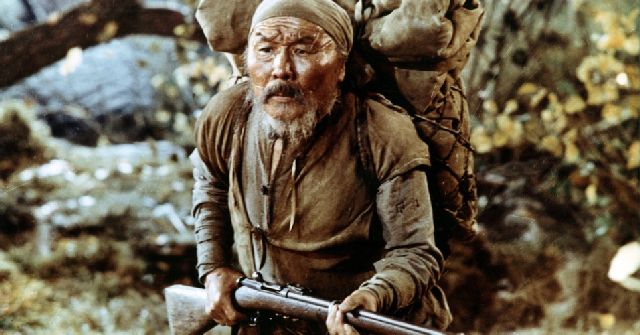Dersu Uzala (1975) 

Director: Akira Kurosawa
Cast: Maksim Munzuk, Yuriy Solomin, Mikhail Bychkov
Synopsis: The Russian army sends an explorer on an expedition to the snowy Siberian wilderness where he makes friends with a seasoned local hunter.
In the early years of the 20th Century, army Captain Vladimir Arseniev (Yuri Solomin) is given the unenviable task of exploring the Ussuri basin in Siberia, close to the Russian border with China. He has with him a small company of soldiers who are willing enough, but comparatively inexperienced at fending for themselves in the inhospitable terrain. Fortunately for them, a local hunter named Dersu Uzala (Maksim Munzuk) stumbles upon their camp one night. The soldiers at first treat him as something of a joke because of his poor command of their language (the subtitles are translated as pigeon English), and his appearance. He’s an old man, but tough and resilient, and after Arseniev takes him on as a guide for the company he soon earns the men’s respect thanks to his ability to negotiate the natural hazards of the wild.
It’s said that the character of Yoda in the Star Wars movies was based on Dersu Uzala and, whether that’s true or not, it isn’t difficult to see why people might make that connection. With his flat, wizened features, stout but sturdy torso and bow-legged gait, Dersu’s resemblance to the Jedi elder is unmistakeable. He’s certainly a likeable chap, and his mangled syntax is strangely endearing. And he is in complete harmony with nature in what would at times seem a hostile and forbidding environment to most people.
Director Akira Kurosawa’s life and career were in the doldrums in the early 1970s. His last release, Dodes’ka-den, had not found favour with the critics, and fearing he had passed his creative peak, Kurosawa attempted suicide by slashing his throat and wrists. He survived the attempt, and shortly after he was contacted by a Russian production company who wanted him to make a film of Captain Arseniev’s autobiographical account of his expeditions to Siberia. It was a project that Kurosawa had long wanted to shoot, but he’d been unable to come up with a way of changing the location from Russia to Japan. The movie re-invigorated Kurosawa’s career, winning the Best Foreign Language Film Oscar and the FIPRESCI and Golden prizes at the Moscow International Film Festival. Dersu Uzala is still highly regarded today, but for me the two parts of the movie do not sit easily with one another. Had the second part of the film retained the smooth narrative flow of the first it would undoubtedly have been an altogether more rewarding experience, but sadly what should have been the more emotive section of the film falls curiously flat.
Part One ends with Arseniev and his men parting company with Dersu following the successful completion of their mission. In Part Two we learn that five years later, Arseniev is tasked with surveying another piece of land in the same region. He hasn’t forgotten Dersu, and is hopeful of meeting up with the man who saved his life on the previous expedition. Sure enough, Dersu makes an appearance, and both men are overjoyed to see one another once more. Once again, Dersu leads them through the inhospitable terrain, and for a while things are as they were five years before. But then Dersu comes to realise that his sight is beginning to fail, and that he will no longer be able to continue living in the wild.
It’s almost as if Kurosawa gets bored with his subjects in the second half of the movie. More attention is given to Dersu and his plight, and Arseniev is virtually demoted to the role of passive observer so that it feels as if their tacit understanding of one another, which was established so effectively in Part One, isn’t quite as deep as it at first seems. Dersu is nature, and Arseniev is civilisation, and Kurosawa labours to explain through events on the screen that the two can never really co-exist without the dominant force imposing changes upon the other. It’s a valid point, but Kurosawa makes it without effective emotion.
The film was shot on 70mm, and some of the scenery is truly beautiful — or at least it would be if the film were restored to its original condition. The print I saw was too often murky and degraded, which only added further to the disappointment…
(Reviewed 30th January 2013)
httpv://www.youtube.com/watch?v=ct_7VNF0_jQ
